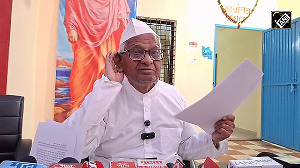Music piracy has gone high tech.
From the dingy units copying cassettes, the action has now shifted to organised IT units, manufacturing top quality CDs and passing them off as originals to consumers, causing the economy losses to the tune of Rs 650 crore (Rs 6.5 billion).
"Sophisticated technology is now in place for manufacturing pirated CDs. It only speaks for the fact that piracy trade has graduated from the stature of a cottage industry to an IT industry with the difference being that it is making no contribution to India's GDP as opposed to a phenomenal one from the IT industry," says Savio D'Souza, secretary general, Indian Music Industry.
Piracy is the unauthorised duplication of an original recording for commercial gain without the consent of the rights owner. The problem of piracy has increased with the rapid advance of technology. New techniques of printing, recording and fixation of broadcast or recorded programmes have emerged, making it easy for the pirates to carry on their illegal activities, he says.
However, he says, "in three of the biggest raids, the IMI's anti-piracy teams with the help of police made seizures worth Rs 32 crore (Rs 320 million) in last one fortnight... we have also collated an exhaustive list of the giant operating in the illegal B-2-B space."
While Delhi recorded India's biggest ever raid with seizures worth Rs 30 crore (Rs 300 million), at the raid in Cannanore, Kerela, pirated goods worth Rs 26 lakhs (Rs 2.6 million) were seized, thereby highlighting the penetration of piracy even in the smaller markets. The third raid, initiated by IMI and conducted by CID, Ahmedabad, exposed the city's biggest piracy racket, thus, preventing spurious goods worth Rs 40 lakhs (Rs 4 million) from flowing into the market, he said.
One of the biggest illegal CD plant was sealed recently in Delhi which had the capacity to manufacture 60 to 70,000 CDs a day, says D'souza noting the technology is so advanced that a person sitting in his home, armed with a computer and CD writer can churt out good quality 200 CDs per hour.
"It's time the government, both the centre and the states, introduce the necessary reforms. This will help give more teeth to the police, who are doing a commendable job as well as better equip the judiciary to take stringent action against the accused," says V J Lazarus of Saregama.
The IMI recently took up the issue of introducing an Optical Disc Law in the country, to fight high tech piracy.
"Under this, it will become compulsory for every manufacturer to put an identification number on a CD, so that it can be tracked to the source," notes D'souza.
As of now there is no control on the movement or manufacture of CDS. Delhi alone has eight CD manufacturing plants and they also are imported from other countries in bulk. It thus becomes very difficult to track the source of the CD, he notes.
Do you want to discuss stock tips? Do you know a hot one? Join the Stock Market Investments Discussion Group





